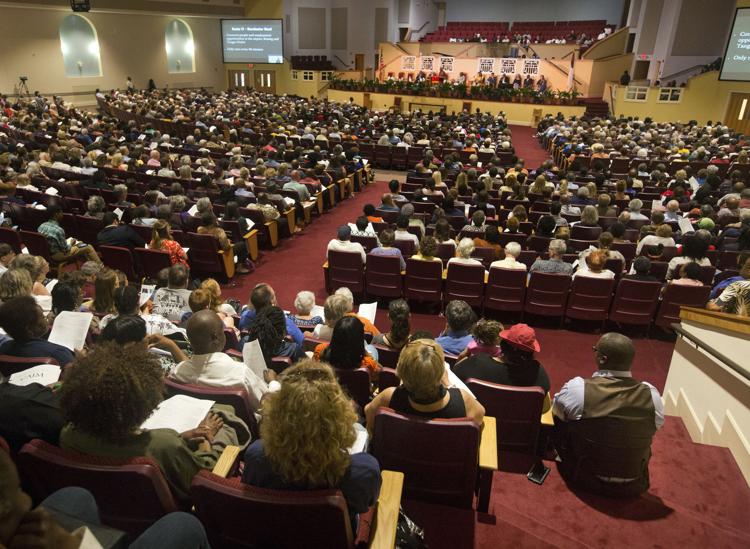By Zharia Jeffries, The Post and Courier
Health care, housing and the ongoing contention over Gadsden Creek are three topics up for discussion at the Charleston Area Justice Ministry’s 11th annual Nehemiah Action event in North Charleston.
The event, held every year since 2012, is the is the culmination of a months-long community listening and research process that engages nearly 1,000 Charleston residents, the organization said in a press release. It will be held at 7 p.m. March 20 at Mt. Moriah Missionary Baptist Church.
This year the organization estimates nearly 2,000 residents will be in attendance.
The event features public access with officials from Charleston City Council, Charleston County Council, North Charleston Police Department and North Charleston City Council, Charleston County School District, and Roper St. Francis.
Each year the organization champions key issues in their community spanning from environmental justice and health care disparities to racial bias in policing.
“This year, we’ve decided to carry forward previous issues,” Reverend Adam Shoemaker told The Post and Courier, co-president for CAJM and pastor of St. Stephens Episcopal Church in Charleston.
Shoemaker said the meeting will address serious community problems concerning the filling of Gadsden Creek, a topic of controversy between residents of the area, CAJM and city officials in the past years.
Also on the docket for Monday’s meeting is the absence of reoccurring funding for affordable housing units and better access to mobile primary care services for the underserved in the community.
Currently, Fetter Healthcare Network provides mobile primary care services in areas around Charleston County.
But Reverend Byron Benton, co-president of CAJM and lead pastor at Mt. Moriah Missionary Baptist Church, said the need for more mobile health services is growing.
“Fetter has a waitlist,” Benton said.
Benton said more mobile units with broader primary care services are needed, such as those equipped with cancer screening and lab testing capability — similar to the mobile health units The Medical University of South Carolina recently unveiled for public use.
CAJM organizers said they’ve held multiple meetings with MUSC officials over the past few years in an effort to get funding from the hospital system to provide the more updated mobile health units to Fetter Healthcare Network.
But funds have still not been administered.
Shoemaker said he will be introducing a proposal for an Affordable Housing Trust program, which would provide generational funding for housing complexes for people who are low-income. That plan will be unveiled at this year’s event in an effort to get buy-in from public officials.
Anna Long, lead organizer for CAJM said similar programs already exist in other cities like Charlotte, N.C.
The trust is expected to provide monetary incentives for housing developers to settle in the areas of highest need rather than in the areas with the best profit, creating opportunities for people making below 60 percent of the area’s median income to live affordably.
More information on how Charleston’s proposed housing trust will function will be given at the event.
Other issues on the docket include ways to reduce unnecessary student suspensions and calls for both Charleston and North Charleston city councils and police chiefs to implement recommendations from each department’s racial bias audit.
North Charleston Police Department’s racial bias audit, published in the fall of 2021 found racial disparities in the department’s interactions with the community, a lack of proper translation services for Spanish-speaking residents and that officers had not been consistently trained in 21st century policing.
A Charleston Police Department racial bias audit, which was published in 2019, reported 48 findings and recommendations for the department to implement in the coming years.
The department recently reported they were nearing a 100 percent completion rate for these recommendations, but advisors from CAJM said their is no data to show how these recommendations will decrease racial disparities in the departments policing practices.
View the original story here.






